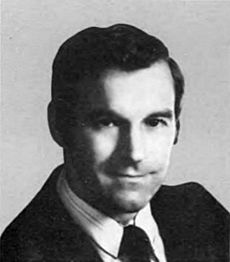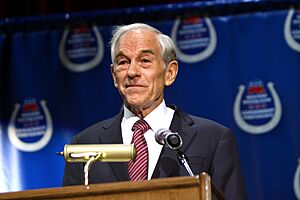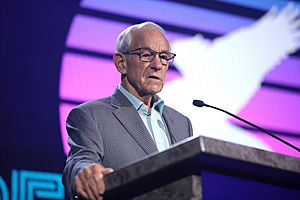Ron Paul facts for kids
Quick facts for kids
Ron Paul
|
|
|---|---|
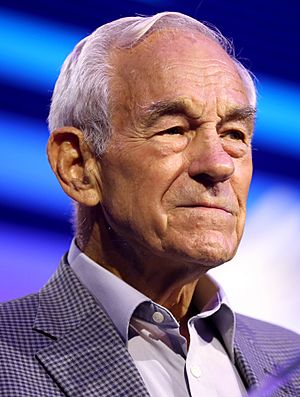
Paul in 2023
|
|
| Member of the U.S. House of Representatives from Texas |
|
| In office January 3, 1997 – January 3, 2013 |
|
| Preceded by | Greg Laughlin |
| Succeeded by | Randy Weber |
| Constituency | 14th district |
| In office January 3, 1979 – January 3, 1985 |
|
| Preceded by | Robert Gammage |
| Succeeded by | Tom DeLay |
| Constituency | 22nd district |
| In office April 3, 1976 – January 3, 1977 |
|
| Preceded by | Robert R. Casey |
| Succeeded by | Robert Gammage |
| Constituency | 22nd district |
| Personal details | |
| Born |
Ronald Ernest Paul
August 20, 1935 Pittsburgh, Pennsylvania, U.S. |
| Political party | Libertarian (1987–1996, since 2015) |
| Other political affiliations |
Republican (before 1987, 1996–2015) |
| Spouse |
Carolyn Wells
(m. 1957) |
| Children | 5, including Rand |
| Education |
|
| Occupation |
|
| Signature |  |
| Military service | |
| Allegiance | United States |
| Branch/service | United States Air Force |
| Years of service |
|
| Rank | Captain |
| Unit |
|
Ronald Ernest Paul (born August 20, 1935) is an American author, doctor, and former politician. He served as a U.S. representative for Texas for several terms between 1976 and 2013. Paul also ran for President of the United States three times. He was the Libertarian Party candidate in 1988 and a Republican candidate in 2008 and 2012.
Paul is known for his strong beliefs in limited government. He often criticized the U.S. government's policies on money, taxes, and foreign wars. He is a critic of the Federal Reserve, which is the central bank of the United States. He also spoke out against the war on drugs and government surveillance programs like the Patriot Act.
Because of his ideas, some people call him the "intellectual godfather" of the Tea Party movement. This was a political movement that wanted lower taxes and less government spending. Before and during his time in politics, Paul worked as a doctor specializing in childbirth. His son, Rand Paul, is a U.S. senator, and they once served in Congress at the same time.
Contents
Early Life and Career
Ronald Ernest Paul was born in Pittsburgh, Pennsylvania, on August 20, 1935. His father, Howard, ran a small dairy company. In high school, Ron was a state champion in the 200-meter dash. He later went to Gettysburg College and graduated with a degree in biology in 1957.
After college, Paul earned a medical degree from Duke University in 1961. He became an obstetrician-gynecologist, a doctor who delivers babies and cares for women's health. From 1963 to 1968, he served as a flight surgeon in the U.S. Air Force and the U.S. Air National Guard. Afterward, he moved to Texas with his wife and started his own medical practice.
Entering Politics
Paul became interested in politics after President Richard Nixon made a major change to the U.S. dollar's connection to gold in 1971. This event made Paul decide to run for the United States Congress as a Republican.
He was first elected to Congress in a special election in 1976. He served for a short time, lost the next election, but won again in 1978. He served in Congress for three different periods: 1976–1977, 1979–1985, and 1997–2013.
During his early years in Congress, Paul was on the House Banking Committee. He argued that the Federal Reserve was responsible for inflation (when prices for goods and services rise). He also spoke out against the military draft. In 1984, he left the House to run for the U.S. Senate but did not win the Republican primary.
Running for President
Paul ran for president three times, sharing his ideas about freedom and limited government with a wider audience.
1988 Campaign
In 1987, Paul left the Republican Party and ran for president as the Libertarian Party candidate. He traveled the country to promote his ideas, especially to students. He finished third in the election with over 432,000 votes, which was a strong showing for a third-party candidate at the time.
2008 Campaign
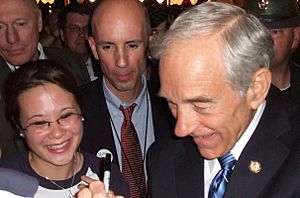
Paul returned to the Republican Party and ran for its presidential nomination in 2008. His campaign gained a large and passionate following online. His supporters used the internet and social media to spread his message.
His campaign raised a lot of money from individual donors. However, he was not able to win any state primaries. He refused to support the Republican nominee, John McCain, and instead encouraged his followers to vote for third-party candidates.
2012 Campaign
Paul ran for the Republican nomination again in 2012. He performed well in early contests, finishing third in the Iowa caucuses and second in the New Hampshire primary. His supporters were very active and organized.
Although he did not win the nomination, he continued to campaign to gain delegates for the national convention. At the 2012 Republican National Convention, many of his supporters protested rule changes they felt were unfair. Like in 2008, Paul did not endorse the Republican nominee, Mitt Romney.
Key Political Beliefs
Paul's political views are based on the idea that the government should have a very limited role in people's lives. He is often called a libertarian and a constitutionalist, meaning he believes the government should only do what the U.S. Constitution specifically allows.
Government's Role
Paul believes the main jobs of the government are to provide national defense and a court system. He thinks most other government agencies and programs should be eliminated. He is famous for voting against new spending and taxes, earning him the nickname "Dr. No." He also supports the right to keep and bear arms and opposes government surveillance.
Foreign Policy
Paul is known for his noninterventionist foreign policy. This means he believes the U.S. should not get involved in the affairs of other countries. He advocates for bringing U.S. troops home from around the world. He also wants the U.S. to withdraw from international groups like the United Nations and NATO. He voted to authorize action after the September 11 attacks but was a strong opponent of the Iraq War.
Economic Ideas
Paul is a follower of the Austrian School of economics, which supports free markets with little government interference. He has consistently called for an end to the Federal Reserve System and a return to a gold standard, where money is backed by gold. He believes this would prevent inflation and create a more stable economy. He also supports free trade but opposes agreements like NAFTA, which he sees as "managed trade."
Life After Congress
After retiring from Congress in 2013, Paul has remained active. He founded the Ron Paul Institute for Peace and Prosperity, which promotes his non-interventionist foreign policy ideas. He also started an online show called The Ron Paul Liberty Report to share his political commentary.
In the 2016 United States presidential election, a "faithless elector" from Texas cast an electoral vote for Paul. This made him one of the few third-party figures to ever receive an electoral vote.
Personal Life
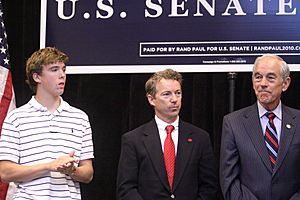
Ron Paul married Carol Wells in 1957. They have five children: Ronald, Lori, Randal (Rand), Robert, and Joy. His son, Rand Paul, was elected as a U.S. Senator for Kentucky in 2010.
Paul and his wife live in Lake Jackson, Texas. He was hospitalized briefly in September 2020 after feeling unwell during a live online broadcast but recovered quickly. His life and political career were the subject of the 2012 film Ron Paul Uprising.
Images for kids
See also
 In Spanish: Ron Paul para niños
In Spanish: Ron Paul para niños
- Criticism of the Federal Reserve
- Draft Ron Paul movement
- Libertarian Republican
- List of federal political scandals in the United States
- List of peace activists
- List of politicians affiliated with the Tea Party movement
- Paulville, Texas
- Students for Ron Paul
 | Sharif Bey |
 | Hale Woodruff |
 | Richmond Barthé |
 | Purvis Young |


